-
ARTÍCULO ORIGINAL22/11/2024
Rondas de cabecera en el entorno hospitalario desde la perspectiva de los equipos sanitarios multiprofesionales
Revista Brasileira de Enfermagem. 2024;77(5):e20230493
Resumen
ARTÍCULO ORIGINALRondas de cabecera en el entorno hospitalario desde la perspectiva de los equipos sanitarios multiprofesionales
Revista Brasileira de Enfermagem. 2024;77(5):e20230493
DOI 10.1590/0034-7167-2023-0493
Visualizações0RESUMEN
Objetivo:
Analizar la configuración de las relaciones de poder entre el equipo multiprofesional en el proceso de rondas de cabecera en el hospital.
Método:
Investigación cualitativa con datos analizados a través del análisis del discurso, basado en el marco teórico de Michel Foucault. De septiembre a diciembre de 2022, realizamos entrevistas y observaciones de campo con el equipo multiprofesional de un hospital de Belo Horizonte, Minas Gerais, Brasil, así como entrevistas cualitativas semiestructuradas con 37 profesionales.
Resultados:
Los participantes señalaron que las experiencias de los profesionales involucrados en las rondas de cabecera dependen de cómo el médico conduce el proceso, y el proceso centrado en el médico dificulta la participación de otros profesionales del equipo.
Consideraciones finales:
La forma en que los hospitales organizan las rondas de cabecera no promueve la articulación del conocimiento de sus profesionales. Además, dificulta la circulación del poder y perjudica el trabajo interdisciplinario en un proceso que mantiene al médico como actor principal de las decisiones clínicas.
Palavras-chave: Conocimientos, Actitudes y Práctica en SaludGrupo de Atención al PacienteHospitalesPráctica ProfesionalRelaciones InterprofesionalesVer mais -
ARTÍCULO DE REVISIÓN22/11/2024
Transition to family parenting in the face of the first child: a scoping review
Revista Brasileira de Enfermagem. 2024;77(5):e20230487
Resumen
ARTÍCULO DE REVISIÓNTransition to family parenting in the face of the first child: a scoping review
Revista Brasileira de Enfermagem. 2024;77(5):e20230487
DOI 10.1590/0034-7167-2023-0487
Visualizações1Ver maisABSTRACT
Objectives:
to identify and summarize the elements that characterize the family transition process in relation to the first child.
Methods:
a scoping review was carried out based on JBI methodology, in six databases, following the Preferred Reporting Items for Systematic reviews and Meta-Analyses extension for Scoping Reviews checklist.
Results:
ten articles were included with factors characterizing the transition, such as hindering/facilitating conditions that influence the process, important support structures in adaptation and strategies/responses used in the transition process.
Final Considerations:
elements characterizing the transition process in relation to the first child were identified. However, no theoretical explanation for this was identified. Further research should be carried out to obtain a deeper understanding of this process.

-
ARTÍCULO ORIGINAL22/11/2024
Prevalence of prescription and effectiveness of analgesia for treating vaginal delivery pain
Revista Brasileira de Enfermagem. 2024;77(5):e20230327
Resumen
ARTÍCULO ORIGINALPrevalence of prescription and effectiveness of analgesia for treating vaginal delivery pain
Revista Brasileira de Enfermagem. 2024;77(5):e20230327
DOI 10.1590/0034-7167-2023-0327
Visualizações0Ver maisABSTRACT
Objectives:
to assess pain management during labor.
Methods:
a cross-sectional study was carried out by reviewing medical records and conducting postpartum interviews. Prevalence and effectiveness of analgesia were assessed.
Results:
the prevalence of non-pharmacological analgesia was 61.86% of 215 women in labor in Obstetric Center and 82.51% of 62 in midwife-led unit. Prevalence of severe pain, on the Visual Analogue Scale, before and after non-pharmacological analgesia, was from 92.16% to 64.04% (p=0.00) in Obstetric Center and from 85.96% to 52.63% (p=0.01) in midwife-led unit. Prevalence of pharmacological analgesia in Obstetric Centers was 15.81%, with no variation in severe pain (p=0.57). Patients’ request for analgesia was associated with education (p=0.00) and pain intensity (p=0.02).
Conclusions:
non-pharmacological analgesia improved pain intensity. Prevalence of pharmacological analgesic prescription was lower than that identified in developed countries. Pain management needs to consider the preferences and needs of women in labor.
-
22/11/2024
Social Technology in the Prevention of Adolescent Violence: documentary production
Revista Brasileira de Enfermagem. 2024;77(5):e20230298
Resumen
Social Technology in the Prevention of Adolescent Violence: documentary production
Revista Brasileira de Enfermagem. 2024;77(5):e20230298
DOI 10.1590/0034-7167-2023-0298
Visualizações0Ver maisABSTRACT
Objective:
To report the development of a technological innovation in the form of a documentary, aimed at disseminating actions for preventing violence against adolescents within the context of Primary Health Care.
Methods:
The documentary was developed through action research and interventions with adolescents in the territory of a Health Unit, conducted between 2020 and 2022, using Social Technology as both an action strategy and a conceptual reference.
Results:
The Social Technology proposal, created through workshops and seminars, resulted in a documentary focusing on violence prevention, involving 48 adolescents. The documentary’s script, collectively developed, portrays a soccer match between teams symbolizing peace and violence, with peace ultimately prevailing. The documentary is six minutes long.
Final Considerations:
The documentary has proven to be an effective Social Technology tool among adolescents, as it fosters critical thinking, is accessible, has potential for digital dissemination, and appeals to the target audience.
-
ARTÍCULO ORIGINAL22/11/2024
Study for the validation of evaluation indicators of electronic health records in immunization: Delphi technique
Revista Brasileira de Enfermagem. 2024;77(5):e20230112
Resumen
ARTÍCULO ORIGINALStudy for the validation of evaluation indicators of electronic health records in immunization: Delphi technique
Revista Brasileira de Enfermagem. 2024;77(5):e20230112
DOI 10.1590/0034-7167-2023-0112
Visualizações0Ver maisABSTRACT
Objective:
To develop and validate indicators for the evaluation of computerized systems in vaccination rooms.
Methods:
Methodological study. From the construction of a logical model for managing information produced in computerized systems in vaccination rooms, an evaluation indicator matrix was developed, and its contents were validated by specialists using the Delphi method. The degree of relevance and clarity were judged, using the following parameters: agreement percentage ≥ 90%; content validity index > 0.78. Internal consistency was tested using Cronbach’s alpha coefficient of 0.93.
Results:
Of the 55 proposed indicators, 48 were validated and composed the final matrix, with 13 in the structure dimension, 29 in the process dimension, and six in the outcome dimension.
Conclusion:
The set of indicators shows validity and high reliability, and can be used to evaluate computerized systems in vaccination rooms throughout the country, as it adhered to the recommendations of the National Immunization Program.
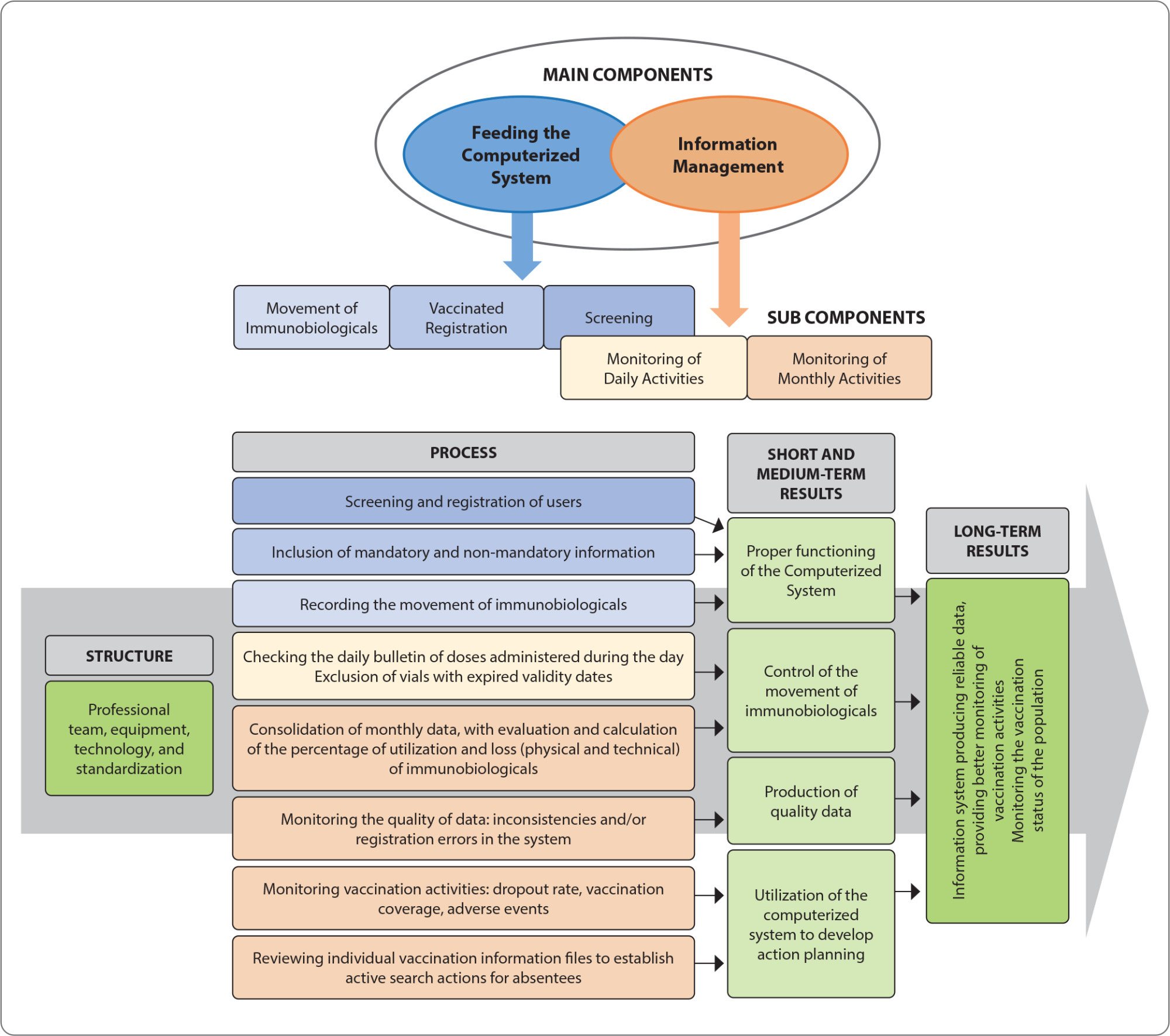
-
22/11/2024
Rondas a beira leito no ambiente hospitalar na perspectiva de equipes multiprofissionais de saúde
Revista Brasileira de Enfermagem. 2024;77(5):e20230493
Resumen
Rondas a beira leito no ambiente hospitalar na perspectiva de equipes multiprofissionais de saúde
Revista Brasileira de Enfermagem. 2024;77(5):e20230493
DOI 10.1590/0034-7167-2023-0493
Visualizações0Ver maisRESUMEN
Objetivo:
Analizar la configuración de las relaciones de poder entre el equipo multiprofesional en el proceso de rondas de cabecera en el hospital.
Método:
Investigación cualitativa con datos analizados a través del análisis del discurso, basado en el marco teórico de Michel Foucault. De septiembre a diciembre de 2022, realizamos entrevistas y observaciones de campo con el equipo multiprofesional de un hospital de Belo Horizonte, Minas Gerais, Brasil, así como entrevistas cualitativas semiestructuradas con 37 profesionales.
Resultados:
Los participantes señalaron que las experiencias de los profesionales involucrados en las rondas de cabecera dependen de cómo el médico conduce el proceso, y el proceso centrado en el médico dificulta la participación de otros profesionales del equipo.
Consideraciones finales:
La forma en que los hospitales organizan las rondas de cabecera no promueve la articulación del conocimiento de sus profesionales. Además, dificulta la circulación del poder y perjudica el trabajo interdisciplinario en un proceso que mantiene al médico como actor principal de las decisiones clínicas.
-
ARTÍCULO ORIGINAL22/11/2024
Knowledge sharing: nurse managers’ practices
Revista Brasileira de Enfermagem. 2024;77(5):e20230287
Resumen
ARTÍCULO ORIGINALKnowledge sharing: nurse managers’ practices
Revista Brasileira de Enfermagem. 2024;77(5):e20230287
DOI 10.1590/0034-7167-2023-0287
Visualizações0Ver maisABSTRACT
Objective:
To analyze how management practices for sharing knowledge are developed in public hospitals in the context of nursing.
Methods:
Qualitative research, carried out with 15 nurse managers from six public hospitals, from July to September 2022. Data were collected through semi-structured interviews and analyzed according to content analysis and in a model for sharing knowledge at work.
Results:
Knowledge sharing in nursing occurs through intraand extra-organizational training (training, courses and events), use of digital communication tools (media and social networks) and individual and collective contact between professionals during the service (experiences, exchange of experiences and assessment feedback).
Final considerations:
Sharing knowledge is relevant to nursing work. To improve it, it must be understood that effective sharing occurs from person to person, in their daily practices, and must be conducted as a strategically planned process by nurse managers.
-
ARTÍCULO ORIGINAL22/11/2024
Interpersonal violence in the state of Espírito Santo: analysis of mandatory notifications between 2011 and 2018
Revista Brasileira de Enfermagem. 2024;77(5):e20230081
Resumen
ARTÍCULO ORIGINALInterpersonal violence in the state of Espírito Santo: analysis of mandatory notifications between 2011 and 2018
Revista Brasileira de Enfermagem. 2024;77(5):e20230081
DOI 10.1590/0034-7167-2023-0081
Visualizações0Ver maisABSTRACT
Objective:
To identify the frequency of notifications of interpersonal violence in Espírito Santo from 2011 to 2018, and the factors associated with this issue.
Methods:
This is a cross-sectional study in which all cases of interpersonal violence from the Information System for Notifiable Diseases in the state of Espírito Santo during the period from 2011 to 2018 were analyzed. Absolute and relative frequencies and 95% confidence intervals were calculated, as well as Poisson regression.
Results:
During the analyzed period, 27,277 cases were reported in Espírito Santo (P: 75%; 95% CI: 74.5-75.4), being more prevalent among females, children, and the elderly, individuals of black/mixed race, people without disabilities, and residents of urban areas. Regarding the perpetrator, there was a higher prevalence of individuals aged 25 years and older, males, with a current or former intimate partner relationship with the victim, and suspected alcohol use at the time of the aggression. In terms of the characteristics of the aggression, there was a higher prevalence of repeat violence, involving a single aggressor, and occurring in the residence.
Conclusions:
The notification of interpersonal violence in Espírito Santo showed a high prevalence and was associated with characteristics of the victim, aggressor, and event. This scenario reinforces the need for interventions such as professional qualification, expansion of intersectoral actions, and reformulation of public policies.
-
ARTÍCULO DE REVISIÓN21/12/2020
Estratégias e competências do enfermeiro no cuidado à saúde dos homens: revisão integrativa
Revista Brasileira de Enfermagem. 2020;73:e20190546
Resumen
ARTÍCULO DE REVISIÓNEstratégias e competências do enfermeiro no cuidado à saúde dos homens: revisão integrativa
Revista Brasileira de Enfermagem. 2020;73:e20190546
DOI 10.1590/0034-7167-2019-0546
Visualizações0Ver maisRESUMO
Objetivos:
sumarizar as evidências científicas sobre as estratégias e competências de enfermeiros no cuidado à saúde dos homens.
Métodos:
revisão integrativa, realizada em sete bases de dados, com recorte temporal de 2009 a 2019, utilizando os descritores “saúde do homem”, “competência profissional”, “enfermagem”, “cuidados de enfermagem” e “masculino” em português e em inglês.
Resultados:
selecionaram-se dez produções, nas quais demonstrou-se que profissionais de enfermagem desenvolvem suas práticas profissionais no que se refere ao cuidado à saúde dos homens, em convergência com as competências gerais da profissão, sendo as mais utilizadas: atenção à saúde; tomada de decisões; comunicação; administração; gerenciamento; Educação Permanente e liderança, consecutivamente.
Considerações Finais:
revelou-se o empenho dos profissionais para o fortalecimento das ações em saúde, direcionadas às necessidades masculinas, em conformidade com as competências gerais da profissão e os princípios e diretrizes da Política Nacional de Atenção Integral à Saúde do Homem.
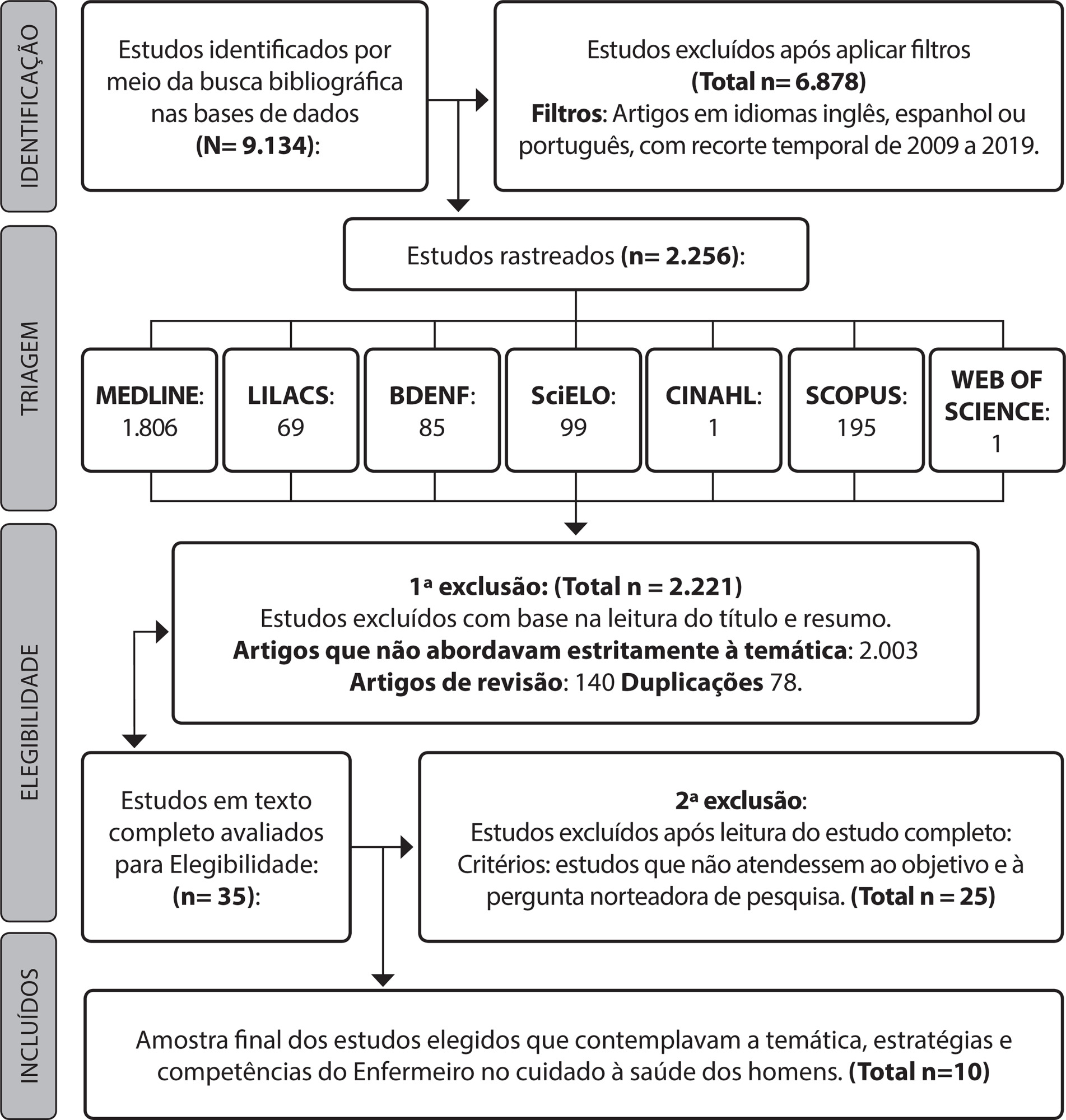
-
ARTÍCULO ORIGINAL21/10/2019
Nursing protocol in vascular trauma prevention: peripheral catheterization bundle in urgency
Revista Brasileira de Enfermagem. 2019;72(6):1512-1518
Resumen
ARTÍCULO ORIGINALNursing protocol in vascular trauma prevention: peripheral catheterization bundle in urgency
Revista Brasileira de Enfermagem. 2019;72(6):1512-1518
DOI 10.1590/0034-7167-2018-0457
Visualizações0Ver maisABSTRACT
Objective:
to create, apply and analyze in clinical practice the effectiveness of a bundle to prevent peripheral vascular trauma to approach the peripheral venous puncture process.
Method:
action research with 435 adult participants in an emergency service from 2011 to 2013. Creation of the bundle for prevention of vascular trauma based on scientific evidence, ease of operation, observation and measurement with implantation through an educational intervention of the team of nursing. Effectiveness analyzed by descriptive and inferential statistics using chi-square. Consecutive sample with 95% confidence interval.
Results:
Five stages of the bundle were related to the catheter fixation, permanence and removal process. The incidence of vascular traumas due to vein punctures reduced by 46.41% after implantation of the bundle to prevent vascular trauma associated with emergency peripheral catheterization.
Conclusion:
The bundle in clinical practice reduced vascular traumas by venipuncture.
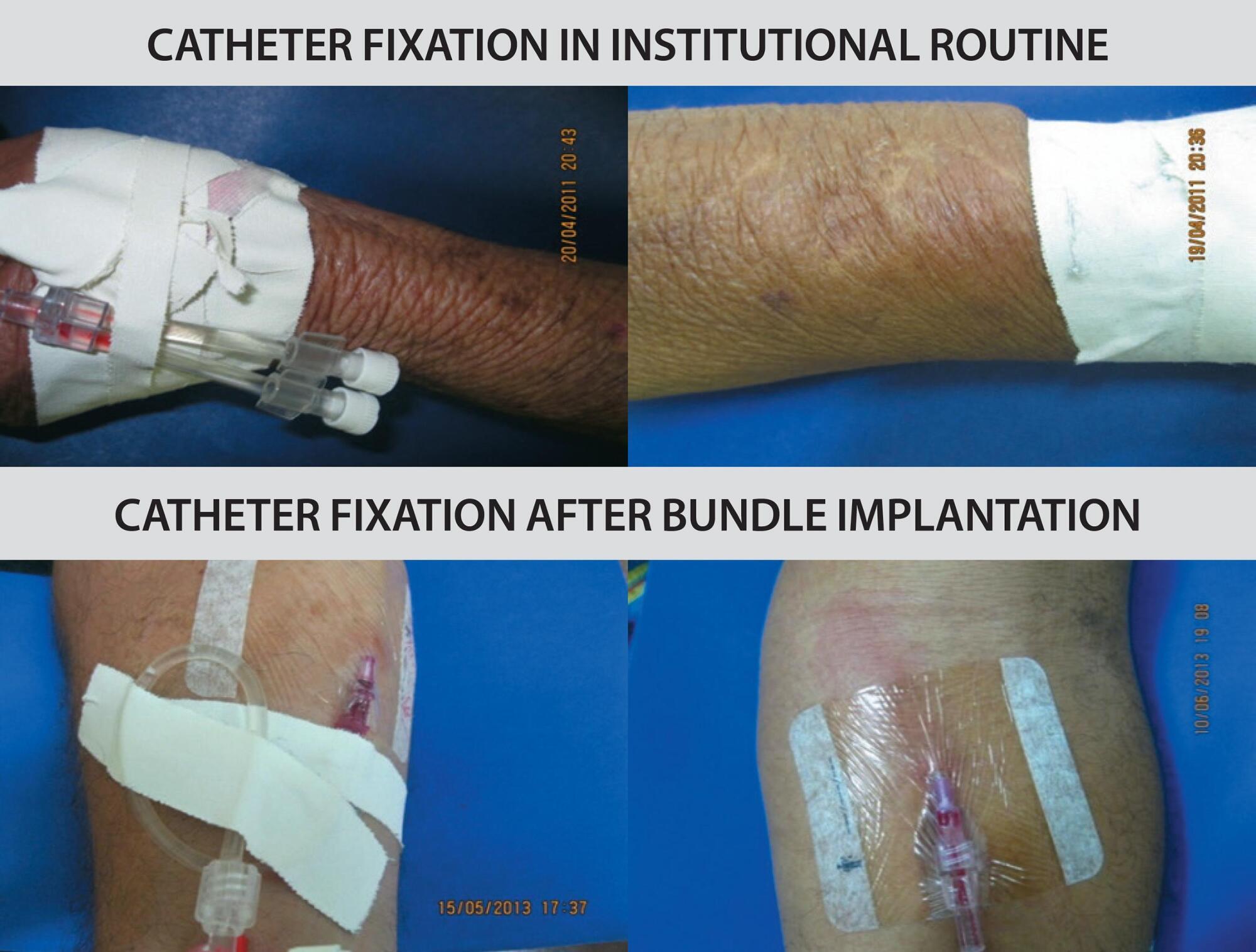
-
ARTÍCULO ORIGINAL31/07/2020
Demandas educativas de familiares de crianças com necessidades especiais de saúde na transição hospital casa
Revista Brasileira de Enfermagem. 2020;73:e20190156
Resumen
ARTÍCULO ORIGINALDemandas educativas de familiares de crianças com necessidades especiais de saúde na transição hospital casa
Revista Brasileira de Enfermagem. 2020;73:e20190156
DOI 10.1590/0034-7167-2019-0156
Visualizações0RESUMO
Objetivos:
analisar as demandas educativas dos familiares de crianças com necessidades especiais de saúde na transição do hospital para casa.
Métodos:
pesquisa qualitativa realizada entre fevereiro e junho de 2018, por meio, de dinâmicas de criatividade e sensibilidade do Almanaque do método criativo sensível; participaram nove cuidadores familiares de crianças, internadas em um hospital público do Rio de Janeiro, cujos dados foram submetidos a análise de discurso francesa.
Resultados:
as demandas educativas foram de origem clínica centrada nos cuidados complexo e contínuo, tecnológico, habitual modificado, medicamentoso, de desenvolvimento, misto e de origem social, relacionada aos insumos e direitos das crianças.
Considerações Finais:
a demanda educativa social emergiu como uma nova tipologia a ser incorporada ao conjunto de cuidados dessas crianças. A transição do hospital para casa deve ser processual, tendo o enfermeiro como coordenador, visando um cuidado participativo, seguro, com qualidade e articulado dentro de uma rede social.
Palavras-chave: Cuidado TransicionalEducação em SaúdeFamíliaNecessidades e Demandas de Serviços de SaúdeSaúde da CriançaVer mais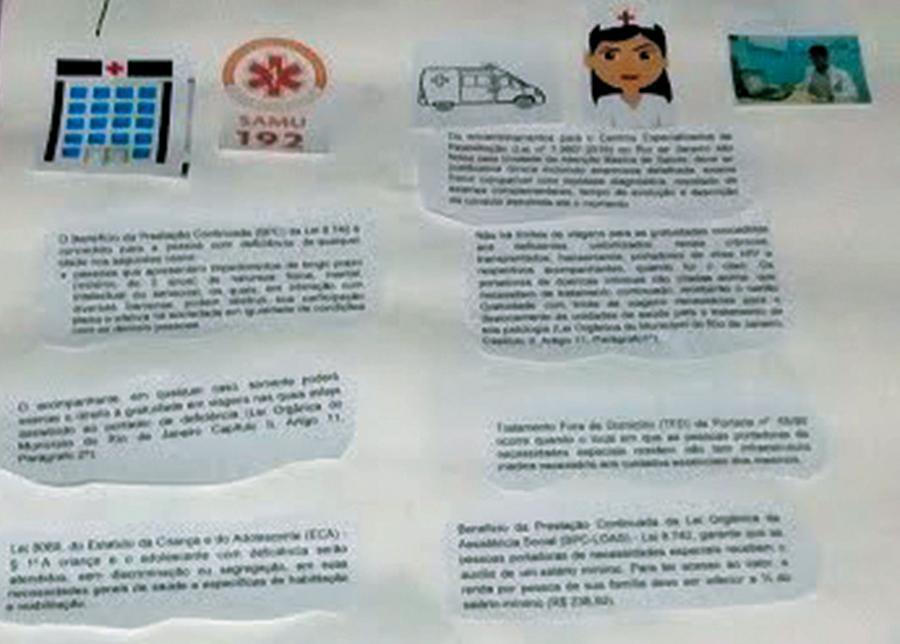
-
INFORME DE EXPERIENCIA13/11/2020
Pedagogical mediations for non-formal nursing teaching during the COVID-19 pandemic
Revista Brasileira de Enfermagem. 2020;73:e20200499
Resumen
INFORME DE EXPERIENCIAPedagogical mediations for non-formal nursing teaching during the COVID-19 pandemic
Revista Brasileira de Enfermagem. 2020;73:e20200499
DOI 10.1590/0034-7167-2020-0499
Visualizações0Ver maisABSTRACT
Objective:
to report the experience of developing pedagogical mediations in a Virtual Learning Environment implemented in a nursing faculty during the COVID-19 pandemic.
Methods:
an experience report on the construction of a distance course aimed at graduates and residents of a nursing faculty at a public university located in the city of Rio de Janeiro.
Results:
the course’s conception, operationalization and implementation were the result of a collective work that culminated in a non-formal, virtual and problematic teaching process, which reached a participation rate of 82% of enrolled students.
Final considerations:
even in times of social isolation, the course promoted collaborative learning of knowledge about COVID-19 and strengthened the relationship between professors and students. The possibility of carrying out distance activities based on solid methodological proposals that contradict the content logic often observed in distance learning is emphasized.

-
INFORME DE EXPERIENCIA05/02/2021
Paulo Freire’s culture circles: contributions to nursing research, teaching, and professional practice
Revista Brasileira de Enfermagem. 2021;74(1):e20190626
Resumen
INFORME DE EXPERIENCIAPaulo Freire’s culture circles: contributions to nursing research, teaching, and professional practice
Revista Brasileira de Enfermagem. 2021;74(1):e20190626
DOI 10.1590/0034-7167-2019-0626
Visualizações0Ver maisABSTRACT
Objectives:
to share the contributions of culture circles for teaching, research, and professional nursing practice, having as framework Paulo Freire’s Research Itinerary.
Methods:
this is an experience report of a culture circle, with participation of three professors and ten students, enrolled in a course of a Graduate Program in Nursing in southern Brazil. In this culture circle, a tree was built in which the roots formed the thematic investigation, the stem, coding and decoding, and the leaves, the Research Itinerary critical unveiling.
Results:
participants demonstrated empowerment of Paulo Freire’s assumptions, and building a tree made it possible to discuss in a pleasant and playful way culture circle use in teaching, research, and professional nursing practice.
Final Considerations:
the culture circle promoted reflection and action on nursing praxis, turning Freirean thoughts into something concrete and transforming realities.

-
ARTÍCULO DE REVISIÓN28/05/2021
Scientific production about palliative care and communication in online journals: a scoping review
Revista Brasileira de Enfermagem. 2021;74(2):e20190378
Resumen
ARTÍCULO DE REVISIÓNScientific production about palliative care and communication in online journals: a scoping review
Revista Brasileira de Enfermagem. 2021;74(2):e20190378
DOI 10.1590/0034-7167-2019-0378
Visualizações0Ver maisABSTRACT
Objectives:
to characterize publications about palliative care and communication, with an emphasis on the approaches addressed, disseminated in online journals.
Methods:
it is a scope review, in which the mnemonic strategy Problem, Concept and Context was used, based on database research. The sample consisted of 86 publications.
Results:
most publications were written in the English language, published in the journal BMC Palliative Care, and with level of evidence IV. As for the approaches approached, the following stand out: Importance of communication in palliative care; Breaking the bad news in palliative care; Training professionals/staff to communicate in palliative care; and Communication strategies in palliative care.
Final Considerations:
the review made it possible to map a significant number of publications on palliative care and communication. It is recommended to produce new studies with better scientific evidence that guide the assistance of health professionals.
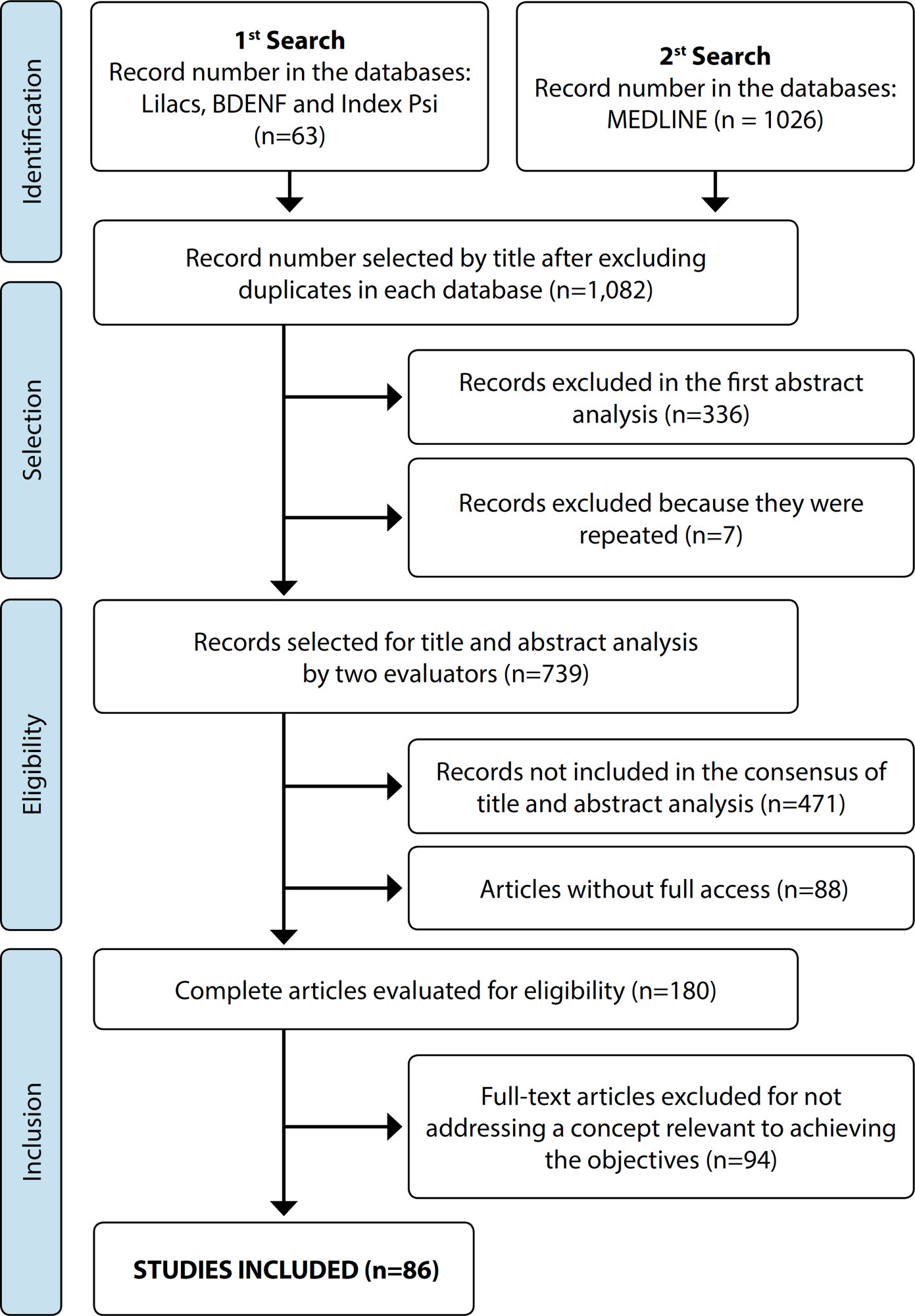
-
ARTÍCULO ORIGINAL10/02/2020
Group Brief Intervention: effectiveness in motivation to change alcohol intake
Revista Brasileira de Enfermagem. 2020;73(1):e20180138
Resumen
ARTÍCULO ORIGINALGroup Brief Intervention: effectiveness in motivation to change alcohol intake
Revista Brasileira de Enfermagem. 2020;73(1):e20180138
DOI 10.1590/0034-7167-2018-0138
Visualizações0Ver maisABSTRACT
Objective:
To verify the effectiveness of the group brief intervention (GBI), performed by nurses in motivational stages to change the pattern of alcohol intake.
Method:
Randomized controlled trial with 3-month follow-up. The ruler of readiness for change was applied in 180 individuals with risk or harmful alcohol intake pattern in basic health unit. Only the experimental group (EG) was submitted to the intervention. Both groups (experimental and control [CG]) participated in the follow-up.
Results:
EG had a mean score before GBI=6.55 (SD=3.41) points (preparation). After GBI=8.00 (SD=2.88) points (action) and in the follow-up 7.92 (SD=3.06) points (action). CG presented a mean score before GBI=5.42 (SD=3.26) points (preparation); after GBI=6.67 (SD=3.05) points (preparation) and in the follow up had a mean score of 4.80 (SD=2.86) points (contemplation). There was a statistically significant difference between the two groups at the motivational stages (p≤ 0,03).
Conclusion:
It was evidenced that GBI was effective in increasing the motivation to change harmful alcohol intake.

Búsqueda
Buscar en:
Nuvem de Tags
Adolescente (85) Atenção Primária à Saúde (239) COVID-19 (91) Criança (91) Cuidados de Enfermagem (269) Educação em Enfermagem (151) Educação em Saúde (139) Enfermagem (930) Enfermagem Pediátrica (86) Estudantes de Enfermagem (77) Estudos de Validação (131) Família (87) Idoso (208) Promoção da Saúde (99) Qualidade de Vida (104) Saúde do Trabalhador (86) Saúde Mental (145) Saúde Pública (82) Segurança do Paciente (150) Tecnologia Educacional (100)



